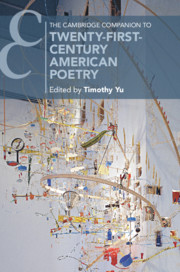Book contents
- The Cambridge Companion to Twenty-First-Century American Poetry
- The Cambridge Companion to Twenty-First-Century American Poetry
- Copyright page
- Contents
- Notes on Contributors
- Chronology
- Introduction
- 1 New Black Aesthetics: Post–Civil Rights African American Poetry
- 2 Traditions of Innovation in Asian American Poetry
- 3 Locations of Contemporary Latina/o Poetry
- 4 Sovereign Poetics and Possibilities in Indigenous Poetry
- 5 Changing Topographies, New Feminisms, and Women Poets
- 6 The Nearly Baroque in Contemporary Poetry
- 7 Disability Aesthetics and Poetic Practice
- 8 Queer Poetry and Bioethics
- 9 Trauma and the Avant-Garde
- 10 Blockade Chants and Cloud-Nets: Terminal Poetics of the Anthropocene
- 11 Give Me Poems and Give Me Death: On the End of Slam(?)
- 12 Anti-capitalist Poetry
- 13 Of Poetry and Permanent War in the Twenty-First-Century
- 14 Poetry in the Program Era
- 15 The Future of Poetry Studies
- Further Reading
- Index
- Cambridge Companions to …
- References
14 - Poetry in the Program Era
Published online by Cambridge University Press: 25 February 2021
- The Cambridge Companion to Twenty-First-Century American Poetry
- The Cambridge Companion to Twenty-First-Century American Poetry
- Copyright page
- Contents
- Notes on Contributors
- Chronology
- Introduction
- 1 New Black Aesthetics: Post–Civil Rights African American Poetry
- 2 Traditions of Innovation in Asian American Poetry
- 3 Locations of Contemporary Latina/o Poetry
- 4 Sovereign Poetics and Possibilities in Indigenous Poetry
- 5 Changing Topographies, New Feminisms, and Women Poets
- 6 The Nearly Baroque in Contemporary Poetry
- 7 Disability Aesthetics and Poetic Practice
- 8 Queer Poetry and Bioethics
- 9 Trauma and the Avant-Garde
- 10 Blockade Chants and Cloud-Nets: Terminal Poetics of the Anthropocene
- 11 Give Me Poems and Give Me Death: On the End of Slam(?)
- 12 Anti-capitalist Poetry
- 13 Of Poetry and Permanent War in the Twenty-First-Century
- 14 Poetry in the Program Era
- 15 The Future of Poetry Studies
- Further Reading
- Index
- Cambridge Companions to …
- References
Summary
This chapter examines the relationship between poetry and academic institutions in the twenty-first century, an era in which creative writing MFA and PhD programs are an established and durable part of the landscape. The real solidification of poetry’s academic situatedness has given rise to poetry that chooses to interrogate the notions of creative freedom and personal expression. Folding an explicitly hermeneutic practice or process into the poetry itself creates a reflexivity that imagines the speaking subject as an actively, discursively analytical subject – one that sees in these analytical methodologies not a way to stifle creative possibility, but to expand it. The work of Myung Mi Kim, particularly Commons, seeks to reconfigure the personal in service of the more broadly intellectual: the lyric speaker as an active analyst both of “lyric” and of “speaker.” Alongside the work of poets like Claudia Rankine and Nathaniel Mackey, the result is what we might call an academic avant-garde at the crossroads of programs in creative writing and those in literature, history, philosophy, and the other humanities.
- Type
- Chapter
- Information
- The Cambridge Companion to Twenty-First-Century American Poetry , pp. 206 - 219Publisher: Cambridge University PressPrint publication year: 2021
References
Works Cited
- 2
- Cited by

